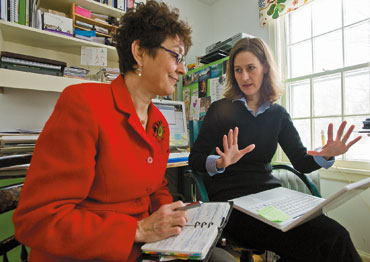Artist confronts those ‘now-what’ moments
There has never been a shortage of struggling artists: Johann Sebastian Bach, Franz Schubert, Edgar Allan Poe and Vincent van Gogh all faced economic hardships that interfered with their ability to create. Prehistoric cave painters should probably have been out hunting and gathering instead of embellishing cave walls with depictions of their lives.
While it is still acceptable to romanticize the artistic inspiration that comes from suffering and pain, if Stephanie Jutt has her way, there will be no more starving artists who sacrifice well-being to make art. “Instead of no child left behind, I’m trying for no artist left behind,” says Jutt.
Jutt is professor of flute at the School of Music, principal flutist in the Madison Symphony Orchestra, member of the Wingra Woodwind Quintet, award-winning soloist heard around the world, and co-director of the Bach Dancing and Dynamite Society of Wisconsin, a summer music festival.
She also knows a thing or two about developing and nurturing arts opportunities and is on a mission to share that knowledge with aspiring artists. She didn’t learn those lessons in school — they came from necessity.

Stephanie Jutt (left), professor of music, and Samantha Crownover (right), executive director of the Bach Dancing and Dynamite Society of Wisconsin, collaborate at Crownover’s home office on plans for the upcoming Arts Enterprise Symposium. The Arts Enterprise Initiative for Arts Entrepreneurship is a new organization headed by Jutt that is designed to teach hands-on survival skills to young artists in the performing and visual arts.
Photo: Bryce Richter
Early in her career, with scholarly credentials, rigorous training and first-place honors in several prestigious music competitions, she had a session with an artist manager to discuss her future as a performer. “He looked me in the eye and said, ‘Honey, I don’t care if you can play better than Jimmy Galway, I can’t sign you because we just can’t sell another flute player.’ I was crushed,” says Jutt. “It was a horrible moment when I felt there was no place in music for me. I was trained to be a soloist, like James Galway. Now what?”
Now what, indeed. She realized she’d have to create new ways of using her musical talent and training. It didn’t hurt that she had an abundance of optimism and just the right amount of chutzpah. “I come from a long line of can-do women. My mother always told me ‘there’s always room at the top’ and ‘there are many ways to skin a cat.’ Boy, was she right,” says Jutt.
So if she couldn’t find a way into music through the front door, she walked around and climbed through an open window. In addition to performing, she organized music festivals in New York City and founded the Blue Ridge Music Festival in Virginia.
As a new professor at UW–Madison in 1992, Jutt collaborated with Jeffrey Sykes, a doctoral student studying piano. The pair created the Bach Dancing and Dynamite Society of Wisconsin (BDDS), which is now an institution in the state’s music scene — BDDS will present its 18th three-week festival this June.
At the time though, some local producers told Jutt that a chamber music festival in Madison wouldn’t play. “Some folks told me not to start another festival; that there was only so much arts money to go around. But I could see I was living in a city that loves music and the arts, and I was so right,” says Jutt.
In can-do style, she called upon her many fellow musician friends from around the country, scrounged free performance space, organized grassroots publicity and played for money tossed into an open cello case, netting $2,000 that first year.
A self-described “serial entrepreneur,” Jutt’s latest venture is the Arts Enterprise Initiative for Arts Entrepreneurship. Her goal is to teach hands-on survival skills to young artists in the performing and visual arts so they won’t have to face a soul-shattering, now-what moment.
The enterprise is a partnership between the university and BDDS. University funding comes from the Kauffman Foundation for Entrepreneurship through UW–Madison’s Office of Corporate Relations. BDDS received $20,000 from the Madison Community Foundation to fund a symposium and a Web site and cover staff time for Samantha Crownover, executive director of BDDS. Jutt credits Crownover as being the brains and organizational genius behind the initiative.
“I want students to learn the tools of the arts trade, just like students in the School of Business receive in their field. We do a fantastic job teaching students the skills they need to become fine artists in their medium, but we have limited involvement helping them plan their future careers,” says Jutt. “There are pockets here and there on campus that help arts students with career survival skills, but there’s no umbrella program. Arts Enterprise hopes to change that.”
Jutt spent months researching successful programs in operation here and at other universities, talking with peers and reading about arts entrepreneurship. The Arts Enterprise Initiative she devised includes a pilot class called Nuts and Bolts: How to Survive in the Real World and Remain an Artist; a Web site to provide students with the latest in arts entrepreneurship developments; a new student association to foster performance, education, outreach and networking; a New Arts Venture Challenge with $2,500 in prize money and mentoring; and a two-day symposium on arts entrepreneurship.
Jutt taught the Nuts and Bolts course in the fall 2008 semester, and she says students from the School of Music were beating down the doors to enroll. They learned about developing a business, finding and writing grants, and writing resumes and professional biographies. They even had headshots taken.
The biggest lessons, though, came from working-artist guest speakers who shared their stories of how they traveled from college graduate to making a living in the arts, showing the students the many possibilities before them. “If I had had that class when I was 22, it would have changed how I approached my career, which operated on a random, whatever falls on me first, that’s what I’m going to do,” Jutt says.
Foremost on Jutt’s to-do list is the Arts Enterprise Symposium taking place at the Pyle Center Saturday–Sunday, Jan. 31-Feb. 1. The opening reception on Friday, Jan. 30, will take place at the Overture Center for the Arts, with featured guest speaker Lt.Gov. Barbara Lawton, who champions the importance of the arts as a contributor to a community’s financial health.
Jutt has organized a schedule packed with hands-on sessions and workshops for artists, as well as presentations of true-life stories from artists and the paths they traveled. Session topics include assessing risk comfort, career planning and marketing, the legal issues of Web design, contracts, business plans, and how to find and receive grant money.
On Saturday, Leon Fleisher, world-renowned pianist, conductor and Kennedy Center honoree, will talk about how he confronted his now-what moment when he lost the use of his right hand. His comeback is one of the music world’s most inspirational stories.
The symposium will close with presentations from the finalists of the New Venture Challenge and the announcement of the winners, who will receive a $2,500 to produce their proposed idea along with some expert mentoring from Jutt and others.
“I see students graduate year after year. I learned so much from doing my own work as an artist and I want to share what I know beyond the closed doors of the flute studio, which I love. I’m not the only one at the university that knows these things, there just hasn’t been a way to share it,” Jutt says. “Arts Enterprise is one of the most exciting things I’ve ever done, because it’s not about me. We’re all in this together. It’s like playing chamber music — not top down but with give and take and sharing what we’ve learned. It’s one glorious collaboration.”
Tags: arts, business, events, faculty, School of Music

